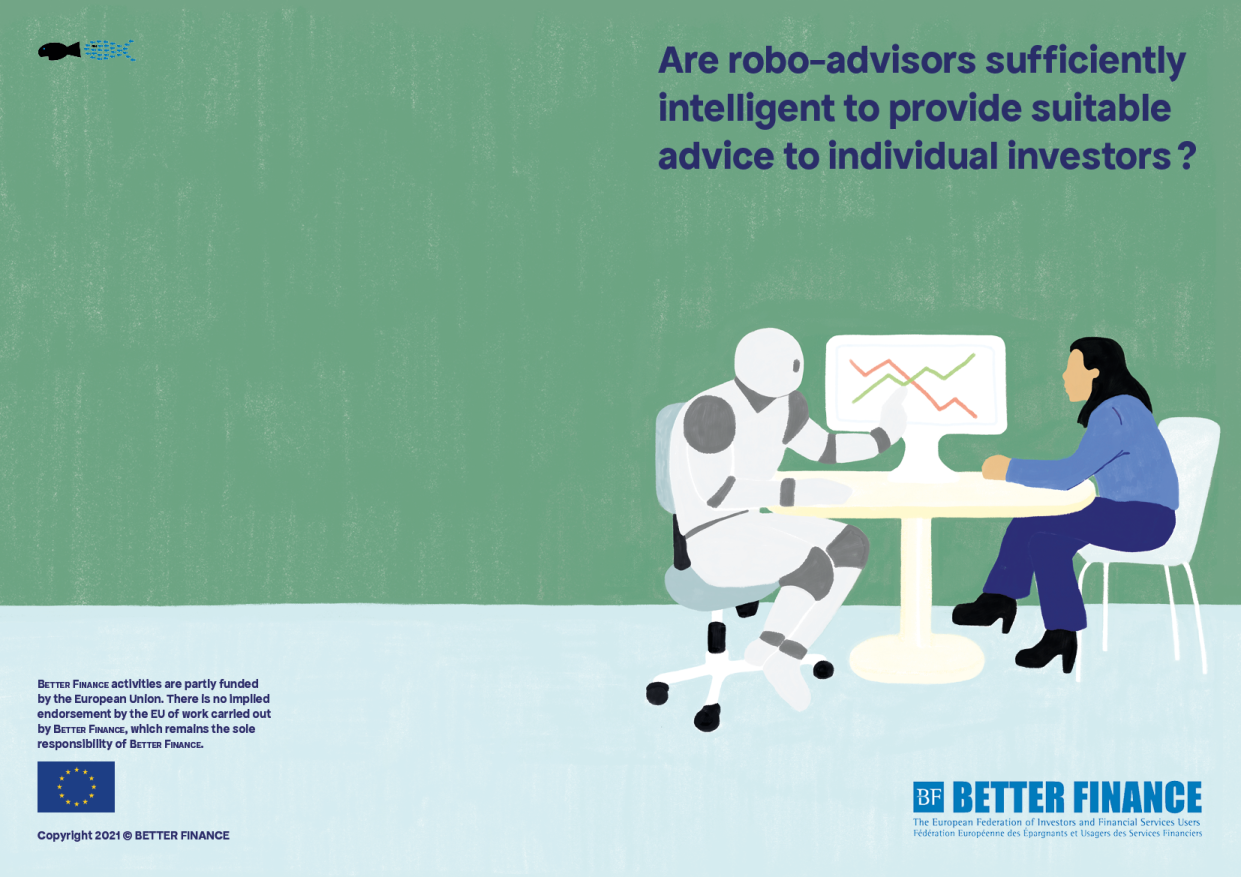 BETTER FINANCE continued its research series into Robo advice with this sixth annual edition, mapping start-up platforms that provide Robo-advisory and investing services, and analysing their user-friendliness, transparency, costs, portfolio composition, the suitability of their recommendations, and sustainability (through mystery shopping). This year the research team selected 18 platforms providing investment advice in 11 countries across Europe, Australia, USA, and Singapore. However, the comparison of the results with the research of the previous 3 years is based on a sample of 9 platforms from Europe and the USA. Looking at the Robo advisors in scope this year, we observed that:
BETTER FINANCE continued its research series into Robo advice with this sixth annual edition, mapping start-up platforms that provide Robo-advisory and investing services, and analysing their user-friendliness, transparency, costs, portfolio composition, the suitability of their recommendations, and sustainability (through mystery shopping). This year the research team selected 18 platforms providing investment advice in 11 countries across Europe, Australia, USA, and Singapore. However, the comparison of the results with the research of the previous 3 years is based on a sample of 9 platforms from Europe and the USA. Looking at the Robo advisors in scope this year, we observed that:
Fees: While there are many pros and cons to Robo-advice, the success of the concept hinges on its ability to keep costs low. In this respect, Robo-advisors do not fall short! By any measure, Robo-advisors continue to be far less expensive than the equivalent services provided by more traditional players such as banks, financial advisors, and asset managers. There has been a constant downward trend in overall fees charged by Robo-advisors since the beginning of this research in 2016, especially in Europe where the lower-end fees continue their downward trend in 2021.
Divergences in asset allocation advice and expected returns: The research also analyses differences in terms of risk, asset allocation, and expected returns for the two investor profiles. Robo-advisors’ algorithms generate significant divergences in expected returns, equity allocation, and associated risk between platforms for the same investor profile. Also, the comparative analysis across 4 years reveals, besides important differences between platforms and investor profiles, significant divergences in expected returns between the years for the investor profiles on the same platforms.
User-friendliness: Over the years, Robo-advisors have continuously improved the accessibility and simplicity of their platforms. However, just 3 platforms have noticeably improved their questionnaire by including new questions about the financial knowledge and investment preferences of the potential client compared to previous years.
Transparency: the combined score of a group of Robo-advisors per category (Fees, Portfolio, Risk, and Past Performance) from 2018 to 2021 reveals that advisors are slowly improving their scores. Although transparency of information (disclosure) on fees improved in 2021, transparency with regards to past performance continues to be the worst-performing indicator, having slightly decreased over the years (2018-2021).
Conflict of interest: according to the information disclosed on Robo-advisors’ websites, most Robo-advisors’ business models do not rely on “inducements” (these are “fee-only”). In this sense, they can be deemed to deliver independent investment advice, thereby eliminating the issue of “conflict of interest” in the retail distribution chain.
Suitability: This report also assesses the suitability of the questionnaires used by the different Robo-advisors. The most concerning finding is that there are very few questions pertaining to the personal situation of the clients, nor do the questionnaires feature many questions on the level of financial literacy of the clients and individual investors. The research also looked into the suitability of the investment recommendations. In terms of diversification, all platforms propose fairly diversified portfolios according to our methodology.
Sustainability: We observed that the platforms do not formulate specific questions aimed at discerning the sustainability preferences of their potential clients. Just one single Robo-advisor allows for a choice between a range of thematic options to be selected during the questionnaire, such as "Ethics" and "Energy of the Future". Conversely, Robo-advisors who do propose sustainable investments, allow for the client to simply switch the investment recommendation from a "traditional" to a "sustainable" one, but only after the Robo-advisor provides the investment recommendation (after the questionnaire). Finally, none of the Robo-advisors disclose information on the sustainable portfolio / investing strategy (integration, exclusion, engagement, impact).
|
BETTER FINANCE wishes to thank Euronext for supporting its research programme. This support is not to be considered in any way an endorsement by EURONEXT of the views and conclusions of this BETTER FINANCE research report. All views, recommendations and conclusions of BETTER FINANCE research reports are its own and completely independent of EURONEXT or any other third party. |
